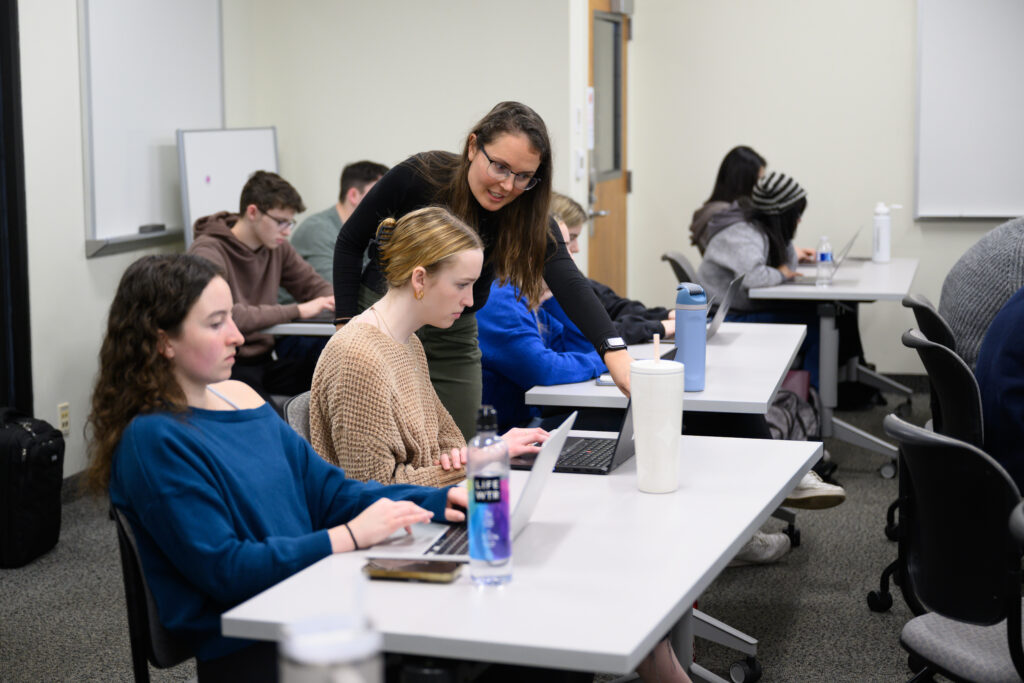Bachelor of Arts (B.A.)

B.A. in Computer Science Overview
Graduates of the Bachelor of Arts degree program will have an ability to:
- Design, implement, and test programs that efficiently solve application problems in high-level programming languages
- Design, implement, and test collaborative solutions for applications using software engineering principles and communication tools
- Describe and utilize systems for managing sequentially and concurrently shared resources
For the Bachelor of Arts in Computer Science degree, the goal is for students to obtain a wide exposure to computer science topics, have the opportunity to undertake skills-focused electives, and have the flexibility to pursue the study of computer science alongside another major. Through the degree requirements, students are expected to obtain exposure to the:
- Fundamental concepts of computer programming (CSC 111, CSC 112)
- Common data structures (CSC 112, CSC 201)
- Fundamentals of algorithmic analysis (CSC 201)
- Mechanisms of program execution, at the architecture (CSC 250) and operating system level (CSC 251)
- Advanced content in areas of interest (CSC 200- and 300-level electives)
The ability to undertake skills-focused electives is realized through allowing one CSC 191 course to count towards the Bachelor of Arts degree. The flexibility to pursue the study of computer science alongside another major is realized through a cap of 30 credit hours required for the Bachelor of Arts degree relative to the 36 required for the Bachelor of Science in Computer Science degree.
What is the difference between the B.S. and B.A. programs?
Neither degree is “better”; they are simply different. The B.S. degree requires more depth in some computer science areas, while the B.A. degree requires fewer hours and allows more flexibility to double major or spend more time in another program in which the student may have a passion and want to bring computer science to bear.
Employers never ask for only B.S. or B.A. students but are more apt to look at the courses and other computer science background.
How to Plan for a C.S. Major
Refer to our Planning for a Computer Science Major section for additional information.
Requirements
Computer Science Hours: You need a minimum of 30 hours in computer science.
Required CS Courses: 111, 112, 201, 250, 251, and 399.
Advanced CS Courses: At least 12 hours must be from computer science courses including 3 hours at the 191 level or higher, 3 hours at the 200 level or higher, and 6 hours at the 300 level or higher.
Mathematics Courses: You need three math courses.
Required Math Courses: MST/MTH 117, one of the following: MST/MTH 121, MST/MTH 205, or MST/MTH 206, and one course selected from MST/MTH 112, STA 111/112/212 or any statistics course approved by the Computer Science Department.
Students with a special interest in multidisciplinary work may wish to consider a program of study that combines computer science with another discipline such as art, business, mathematics, biology, and others.
Students wishing to take graduate-level classes, 6XX or 7XX, for undergraduate or graduate credit, should follow the directions at Undergraduates Taking Graduate courses.
Return the form to the Registrar’s office in Reynolda 110.
CS Degree Programs
The Department of Computer Science offers the following programs for undergraduate and graduate students:
Applying for Admission
Visit our admissions website for information on how to apply for admission.
Undergraduate Resources
Course Information
Special Programs
